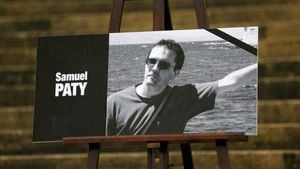Nigeria is currently witnessing significant public outcry over the treatment of minors allegedly detained for participating in protests against the government. Following the collapse of several young protestors during a court hearing, President Bola Tinubu has ordered their immediate release.
The 27 teenagers, detained for participating in protests against Nigeria's worsening economic situation, were part of 76 suspects facing serious treason charges. These individuals, ranging from 14 to 18 years old, have been held for nearly three months and were visibly distressed during their first court appearance. Their plight sparked widespread outrage when videos of them collapsing due to apparent malnourishment went viral, prompting renewed discussions about the treatment of protestors and the conditions within detention facilities.
Capitol officials reported the minors' record of malnourishment and the horrific conditions of their confinement. The protestors had been part of the #EndBadGovernance demonstrations, which took place last August, fueled by frustrations over rising living costs. The protests were marked by violence, with police reporting several fatalities, though human rights organizations suggest the death toll was even higher.
While the government characterized the groups, including teenagers, as attempting to provoke civil unrest, their treatment has raised serious humanitarian concerns. Dozens of young individuals standing trial faced charges started to garner perennial scrutiny, especially from human rights advocates. Their detention was described by local organizations as nothing short of institutional child abuse, with calls for investigations and legal reforms to prevent future occurrences.
Under growing pressure from activists and the public, President Tinubu has not only ordered the release of the minors but has promised investigations to determine how the law enforcement agencies managed their arrests and prosecutions. This response highlights the increasing tensions between the government and citizens, as frustrations boil over amid economic difficulties.
Directly addressing the situation via his spokesman, Bola Onanuga remarked on the humanitarian steps being taken to facilitate the release and the safe return of these vulnerable minors to their families. At the same time, he emphasized the need for necessary legal processes to continue without prejudice.
Human rights organizations have also played significant roles, with groups like Amnesty International describing the children's detention as one of the deadliest attempts to suppress public assembly rights. Protests highlighting issues around freedom of expression and the treatment of citizens were met with strict government crackdowns, raising alarms both domestically and internationally.
Activists and family members of the detained minors have maintained pressure on the government to take responsibility for the conditions these children endured. They highlighted the urgent need for reforms within the police forces to safeguard the rights of young citizens participating peacefully within civil demonstrations.
While this order for release is seen as positive progress, it is only one step forward amid broader calls for justice and accountability from law enforcement. The situation remains fluid as the released youths navigate their futures under the heavy shadow of serious allegations.
Looking forward, this case could lay the groundwork for significant legal and social reforms within Nigeria. The hope among many observers is for broader recognition of the rights of youth and the role of peaceful protest within Nigerian democracy. President Bola Tinubu's actions could signal either continued repression or the beginning of healing within the social fabric of the nation.



